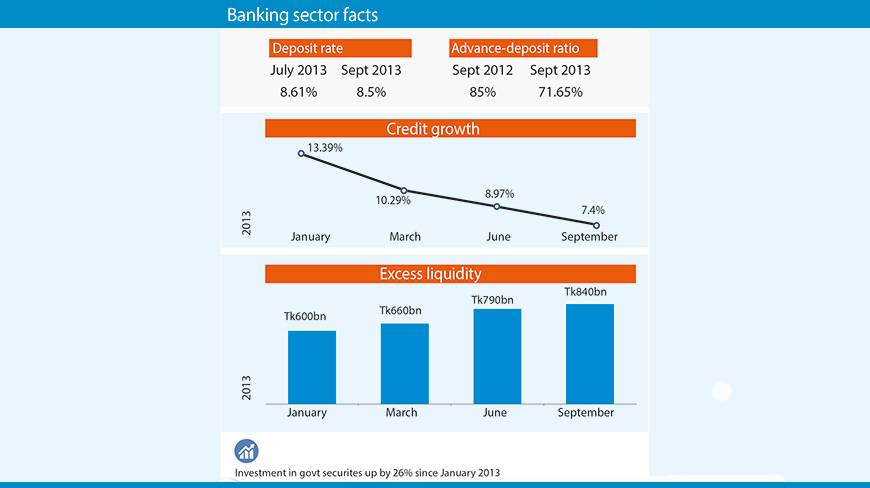Banks burdened with excess liquidity
Posted by on Thu, Nov 07 2013 02:48 pm

The country’s commercial banks are awash with idle money due to poor investment and lower credit demand, with almost all kind of business expansion remained suspended amid political uncertainty ahead of the upcoming general election.
The excess liquidity increased by Tk240bn or 40% during January-September period of the current year and stood at Tk840bn from Tk600bn in January, according to the Bangladesh Bank data.
The amount of surplus liquidity increased rapidly while credit growth dropped continuously.
The credit growth of the banks was 13.39% in January with surplus liquidity of Tk600bn, followed by 10.29% growth in March with Tk660bn in excess liquidity. The growth was 8.97% in June when the liquidity was Tk790bn and 7.40% in September as the liquidity rose to Tk840bn.
The banks burdened with the huge idle money were looking for alternative investment window as reflected from their rising investment in the government securities.
The banks’ investment in government securities increased by 26% to Tk1tn during the 9 months period till September from Tk990bn in January, according to the central bank data.
“The investment opportunities for the banks shrunk due mainly for political unrest, lack of gas and electricity. Besides, they have also barrier to invest in share market according to the amended bank company act,’’ said a senior executive of a private bank.
However, the banks were taking away investment from the capital market instead of reinvesting there as they are bound to keep their exposure limit at 25% of paid up capital and reserves, which also pushed the liquidity to go high, he said.
“As a election year, banks remained shy to disburse big loans throughout the year and in last two months, there will have no possibility to release big loans,” said National Credit and Commerce Bank Managing Director Nurul Amin.
He said credit growth also decreased due to inflow of low cost foreign loans in the private sector as provided by Bangladesh Bank.
“Banks already cut their lending rates slightly to attract the borrowers and the rate will go down further within December,” said Amin, also the President of Association of Bankers Bangladesh (ABB).
The deposit rate dropped to 8.5% in September from 8.61% in July as banks reluctant to take more public funds.
“Banks’ interest income against credit declined due to sluggish disbursement while their interest expenditure against deposit went up, adversely hitting the profit. As a result, banks cut the interest rate on deposits and also moved to reduce lending rates to stimulate credit,” said a senior executive of a private bank.
The advance-deposit ratio (ADR) in the overall banking sector also declined to 71.65% in September against 85% a year back.
The ADR is likely to go down further in the coming months, if the current sluggish trend of credit to the private sector continues and the political situation takes a turn towards further confrontational course again.
News:Dhaka Tribune/07-Nov-2013
Other Posts
- Most banks report profit in Q3
- Agri-loan disbursement up by 24.82pc in Q1
- BKB signs deal with DBBL on m-banking
- Grameen Bank Act gets passage
- Secretaries’ committee submits recommendation to finance minister
- Guideline to check online banking forgery next month
- Palli Sanchay Bank: Row continues within government
- Governor calls for green credit policy




Comments